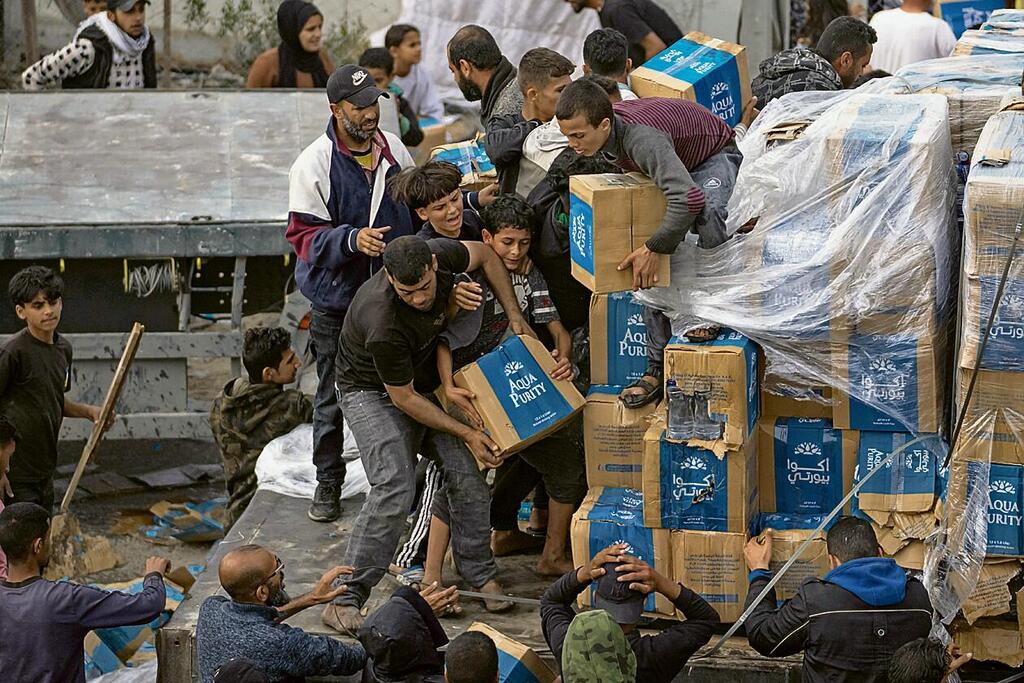Getting your Trinity Audio player ready...
Chaos and turmoil are sweeping through Gaza with widespread murders and looting as Hamas loses its grip over the Palestinian enclave during the war.
After 17 years of tight control by the terrorist organization, the territory now faces unprecedented anarchy, with longstanding family feuds resurfacing, including attempts to settle old scores.
Following IDF airstrikes, some exploit the situation to loot destroyed homes, but it doesn’t stop there. Medical supplies have also become a target, as recently seen when Gazans stole medical equipment and medicine from the European Hospital in the southern city of Khan Younis, immediately selling them in the streets amid lawlessness. This compounds on top of widespread looting from humanitarian aid convoys.
Security sources familiar with the situation told the London-based newspaper Asharq Al-Awsat that Gaza is now also beleaguered by the resurgence of old conflicts. "Many people have been killed in incidents related to the First Intifada in 1987, while others have died in family disputes," they said, referring to a sustained series of protests, acts of civil disobedience and riots carried out by Palestinians against Israel.
Semi-official data obtained by the newspaper indicates that at least 14 people were murdered in June, and another 21 in the previous month, in various criminal conflicts across the Gaza Strip. It is alleged that at least three of these incidents are connected to Hamas’ 2007 coup and its subsequent declaration of war on the rival Fatah movement which heads the internationally-recognized Palestinian Authority in the West Bank.
One victim of such violence in recent months is Mahmoud Nashbat, a resident of the Bureij refugee camp in central Gaza, who was a commander of Fatah's Al-Aqsa Martyrs' Brigades and had been wanted by Israel for 20 years. Nashbat was killed in the Deir al-Balah refugee camp by unidentified assailants, who are confirmed to be affiliated with Hamas.
Hamas operatives inflict corporal punishments on starving Gaza civilians accused of looting humanitarian aid warehouses
The National and Islamic Forces in Gaza, a coalition of the different factions within the territory, issued a statement expressing its opposition to "reopening cases that all Palestinians agreed to close and are not subject to discussion," referring to cases of suspected espionage for Israel during the First Intifada in 1987.
"Such actions sow the seeds of conflict by threatening peaceful individuals under the guise of revenge," the group added, calling on Hamas' Interior Ministry to "deal harshly" with anyone who dares to interfere in civilians' lives.
The "First Intifada portfolio" in Gaza is considered complex and convoluted, as it is filled with hatred among residents who accuse others of killing relatives for various reasons, including collaboration with Israel.
A source from one of the factions in Gaza which is familiar with the details told Asharq Al-Awsat that reopening such a case would jeopardize social security in the enclave, lead to crimes under false pretenses targeting national figures, and allow Israel to exploit the situation to advance its agenda aimed at changing the security reality.
According to reports from Gaza, there are vigorous efforts on the ground to contain these developments, but the chances of success remain unclear. Hamas, for its part, is trying to project governance and control, recently releasing several videos showcasing how its operatives brutally beat residents accused of looting.







